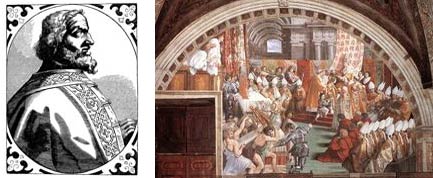How Charlemagne Changed the World

Each Monday, this column turns a page in history to explore the discoveries, events and people that continue to affect the history being made today. Europe was mired in a centuries-long dark age before a king named Charlemagne came along and turned on the light switch. By encouraging arts, culture and education, the 8th-century Frankish king – who would eventually become the first Holy Roman Emperor – tugged the continent out of cultural stagnation that threatened to never end.
Both a fierce warrior and in many ways the first Renaissance man, Charlemagne's achievements on the battlefield and in his laws led to the first notion of a pan-European identity.
Post-Roman mess
After the break up of the Roman Empire in the late 5th-century, its eastern Byzantine half flourished while the western region disintegrated into a collection of fragmented kingdoms without any central authority. Europe was entering its fourth century of the "Dark Ages" when Charlemagne was born in A.D. 742, a time marked by frequent warfare, few important cultural achievements and the virtual cessation of learning. Charlemagne became ruler of one of those kingdoms in Germany in A.D. 768 and immediately set about expanding his territory. Through the course of more than 50 battles, most of which he led in person, he'd conquered almost all of mainland Europe. Everywhere his rule was established, Charlemagne instituted the same reforms, creating a common identity in people from eastern Germany to southern Spain.
Commerce boomed
One of the most important changes Charlemagne made was abandoning the gold standard and putting all of Europe on the same silver currency. Trade became easier and the continent prospered, aided by laws that took some power away from the nobles and let the peasantry participate in commerce. The lower classes benefited in other ways under Charlemagne, who was frustrated with the nobility's sense of entitlement and had deep sympathy for the peasants, according to historians. Among other legislation, all local regional governors were subject to regular inspections by royal emissaries to make sure no injustices were being done.
Educational reform was also high on Charlemagne's agenda. The progressive leader loved to learn, historians say, and so encouraged schooling throughout his kingdom in his chosen lingua franca, Latin. All of a sudden, not only were the once-fractured regions of Europe connected by peaceful trade networks and common laws, but people could communicate with each other too.
Sign up for the Live Science daily newsletter now
Get the world’s most fascinating discoveries delivered straight to your inbox.
For spreading Christianity across Europe and to recognize his achievements as the territory's wide-reaching ruler, Charlemagne was crowned Emperor by Pope Leo III on Christmas Day in A.D. 800. He was the first Emperor to rule the continent since the fall of Rome and was seen as a powerful adversary to the successful Byzantine Empire, centered in modern-day Turkey. Though the territory would splinter again in the centuries that followed, Charlemagne's reforms were the spark that ignited Europe's cultural rebirth.
- Last Week: How Gunpowder Changed the World
- Next Week: How the Magna Carta Changed the World
- Everyone on Earth Has Royal Roots
- Medieval Torture's 10 Biggest Myths
Why is yawning contagious?
Scientific consensus shows race is a human invention, not biological reality










